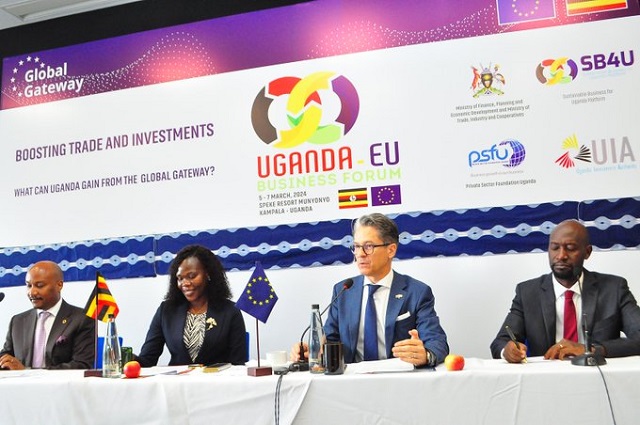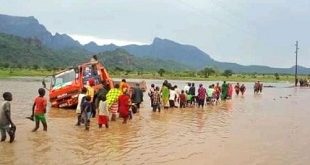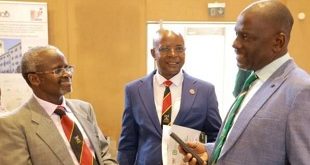
Kampala, Uganda | THE INDEPENDENT | European Investment Bank (EIB Global) and Centenary Rural Development Bank Ltd (“CERUDEB”) have announced the agreement to make over 426 billion shillings (€100 million) available to private sector enterprises, with a focus on female borrowers and microenterprises in rural areas.
A statement from EIB says the investment represents EIB Global’s largest-ever microfinance loan to any country in the African, Caribbean, and Pacific (ACP) regions.
The investment partnership between the two financial institutions was made ahead of the formal signing of the deal during the EU-Uganda Business Forum, in the presence of Uganda’s President Museveni.
The final beneficiaries are micro-entrepreneurs or micro-enterprises with less than 10 full-time employees. The investment also aims at supporting lending to financially underserved entrepreneurs in rural areas as their businesses continue to recover from the COVID-19 pandemic. 60% of the funding shall go to projects in rural areas outside the capital city of Kampala.
CERUDEB shall use at least 50% of the financing to support women-run or women-owned businesses, in line with the EIB’s 2x Challenge criteria and SheInvest initiative.
As per a previous United Nations Capital Development Fund (UNCDF) Uganda Business Survey from 2020, micro-firms and female-led firms face the largest constraints, with 80% of the firms reporting difficulties in access to capital.
Financial services uptake indicates that only 11% of firms have a bank loan or line of credit, a proportion less than half of the average of countries in Sub-Saharan Africa. Most micro- and small enterprises remain excluded from mainstream banking because the focus tends to be more on corporates and high net-worth individuals.
EIB Head of the Regional Hub for East Africa, Edward Claessen said according to recent studies, access to finance remains the greatest obstacle to investment in Africa.
“Micro-firms and female-led firms face the largest constraints, with majority of the firms reporting difficulties in access. The funding opportunity offered to Centenary Rural Development Bank will go a long way in addressing these challenges and spurring the economic growth of Uganda,” Claessen said.
Fabian Kasi, the Managing Director at Centenary Bank said the partnership investment aligns with Centenary Bank’s strategy and reinforces its focus to grow its “mission critical” portfolio.
“Particularly extending our financial inclusion agenda to the bottom of the pyramid through increasing access to credit in the areas of microfinance and agriculture lending. Currently, we allocate 20% of the lending portfolio to Agriculture,” he explained. Kasi further explained that the bank will target to issue 1.9 million loans to small growing business and micro-enterprises, with a specific focus on empowering 970,000 women or women-run businesses and 1.17 million loans to micro-enterprises in rural areas.
“This is not merely about the numbers; it is about transforming lives sustainably, uplifting communities, and laying the foundation for a more inclusive and resilient economy,” said Kasi.
Ambassador Jan Sadek, Head of the European Union Delegation to Uganda said the investment partnership with a focus on women-led and owned businesses is an excellent example of how Uganda can gain from the Global Gateway, which is the EU’s investment strategy aimed at leveraging investments in sectors that are key for sustainable and inclusive growth.
He said through the Global Gateway, the EU is able to pool resources from our Member States and European financial institutions to narrow investment gaps while promoting competitiveness.
CERUDEB`s main strategic objective is to be the preferred provider of innovative financial solutions, especially microfinance and a strong catalyst for sustainable socio-economic change. The bank has been a long-time partner of the EIB since 2008, benefiting from investments of over €61 million so far.
The Ugandan Bank has also benefitted from EIB’s technical assistance multiple times in the past, including to increase its outreach and training to refugee clients, to improve its environmental and social guidelines, to train its agricultural loan officers, and to better support the bank`s smallholder clients.
CERUDEB launched operations in 1983 when it was established on the initiative of the Ugandan Catholic Church to provide microfinance and financial services to the agricultural sector. Headquartered in Kampala, today, the bank has 80 branches throughout the whole country and a network of more than 7,400 agents. These agents support with extending financial services to customer especially those in remote locations.
The bank has grown over the years to become the second largest bank in Uganda in terms of assets (12% market share) and deposits (10% market share). In addition to its public sector lending to governments, the EIB recognises that strong financial intermediaries are key to addressing market challenges and suboptimal investment situations across the African continent.
Edward Claessen said European Investment Bank Global the EIB arm financing counterparts outside Europe is building on its many years of experience and partnership with banks, microfinance institutions and private equity funds by supporting their efforts to innovate and enhance the scope and financial inclusiveness of their outreach
. “It also considers non-banking financial institutions, such as guarantee funds, leasing companies or fintechs, that have a financial model to enable greater outreach to underserved smaller businesses,” Edward Claessen added.
The EIB in partnership with the various financial institutions in Uganda has provided over €346 million so far to support private sector businesses, targeting agriculture and gender equality.
Accompanying technical assistance was also offered to these banks or microfinance institutions and their clients across a wide range of topics including risk management, product development, environmental and social assessment, financial literacy among other
*******
URN
 The Independent Uganda: You get the Truth we Pay the Price
The Independent Uganda: You get the Truth we Pay the Price


